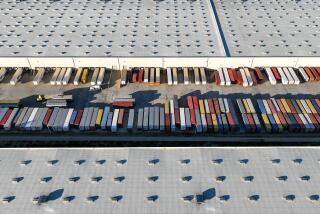Small Town Rocks Retail Giant
The tiny city of Hercules flexed its municipal muscle this week, when the City Council voted unanimously to keep Wal-Mart out by forcing the retail giant to sell its 17-acre site through eminent domain.
Cities have used local ordinances and ballot measures to keep the controversial company at bay, but the Hercules vote is a rare instance of a city using eminent domain against a retailer rather than on its behalf.
“For so many years, it was Wal-Mart going to redevelopment agencies, asking for them to condemn on their behalf,” said Gale Connor, an attorney for Hercules, a Bay Area city of 24,000. “This strikes a nerve, the shoe being on the other foot.”
Wal-Mart spokesman Kevin Loscotoff called the council’s vote “frightening” and said his company is evaluating its legal options.
“This resolution means that government agencies can use the really awesome power of eminent domain merely because they don’t like the property owner’s land use application or the property owner,” he said.
An estimated 300 people packed City Hall on Tuesday night to testify before the council, and an overwhelming majority clamored for the city to keep out the proposed 99,000-square-foot Wal-Mart Supercenter and protect their town’s views and unique flavor.
Nestled on the eastern curve of San Pablo Bay -- the Bay Area’s other bay -- Hercules is a former company town that grew up around the nation’s leading dynamite producer.
The plant eventually switched over to fertilizer production and closed in the 1970s. A small refinery moved in, then shut down in the 1990s.
The city is now known for its careful redevelopment of more than 400 acres of industrial land. The plans have a pronounced New Urbanist flair, all pedestrian-friendly neighborhoods and houses that greet streets with porches instead of garages. A waterfront town center is in the works, with a proposed train station and ferry stop and a mix of shops and restaurants.
A big-box store “is not what we had planned for this community,” said Brenda Smith Johnson, who has lived in Hercules since 1992 and attended the Tuesday night meeting. “I’m proud to live in this community. Little Hercules, we really stepped up to the plate.”
Wal-Mart bought the land in November, filed plans to build a 142,000-square-foot store and later revised its proposal downward at the city’s behest. In March, the city offered to buy the land from the retailer for $13 million.
Although the city insists that a development plan with a maximum store size of 65,000 square feet was in place when Wal-Mart bought the land, Loscotoff said the company had never been told of that limit and that the city never fully reviewed its 99,000-square-foot proposal.
Harley Shaiken, a UC Berkeley professor who specializes in labor issues and has followed Wal-Mart for many years, called the city’s action “Wal-Mart’s worst nightmare.”
And he said that, while this is the first time he has heard of a city taking such action, “it is not likely going to be the last time.”
“Eminent domain we associate with a poor holdout homeowner in the midst of a freeway route,” he said.
“Now it’s America’s largest retailer and employer getting property seized.”
More to Read
Inside the business of entertainment
The Wide Shot brings you news, analysis and insights on everything from streaming wars to production — and what it all means for the future.
You may occasionally receive promotional content from the Los Angeles Times.











